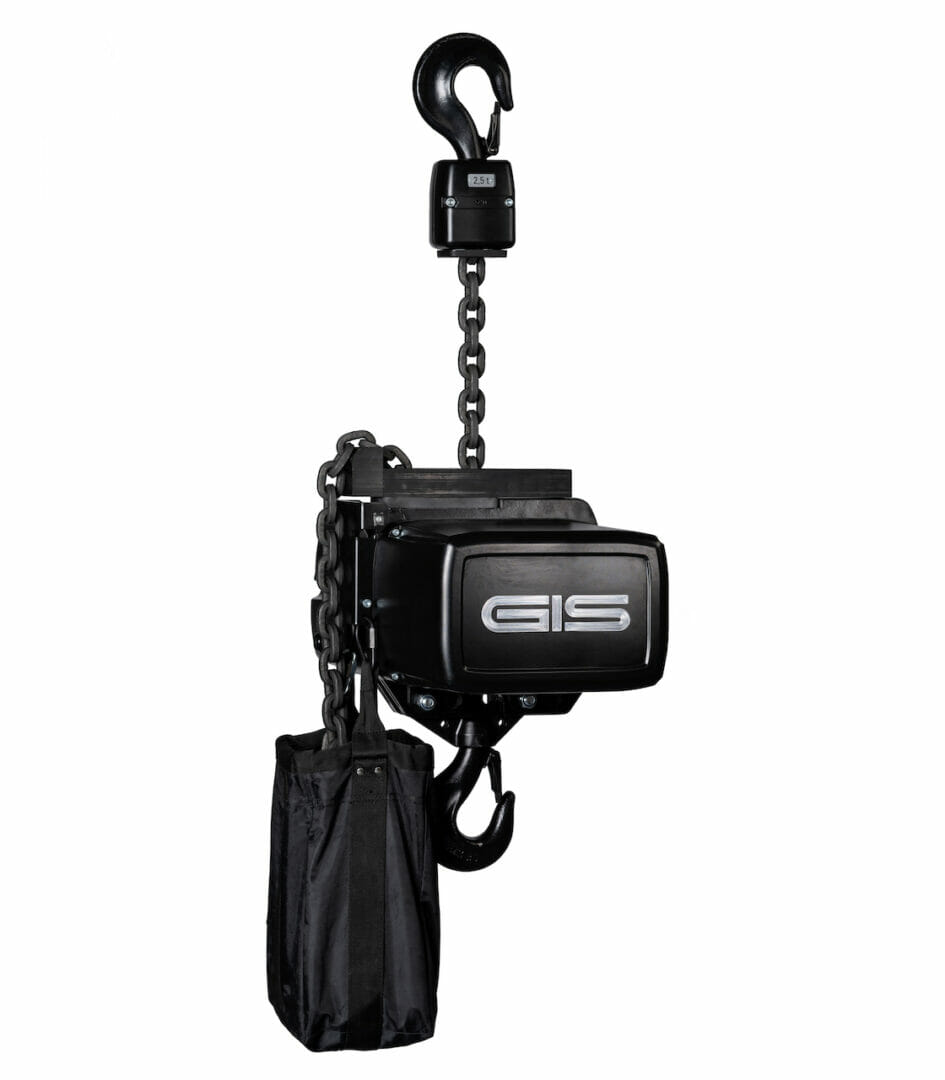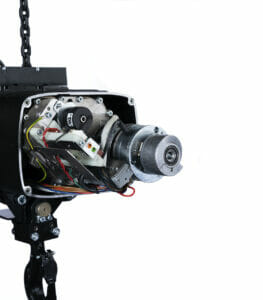
Swiss electric chain hoist manufacturer GIS AG has expanded its LP electric chain motor series for the entertainment industry with the addition of two new models, the LP1600 and LP2500. The latter takes the capacity range to 6,300kg. At the same time, the new GHF/GMF generation of manual and motorised trolleys is also being put to market.
The LP1600 completes the LP series with maximum capacities of 2,500kg (D8), 1,600kg (D8+) and 1,250kg (C1). It ranges from the 13kg light LPM250 for 250kg lifting capacity in the D8+ version to the two new models, available now.
The LP2500 represents a milestone in the company’s 55-year history of producing chain hoists, in that it increases the highest capacity from previously 5,000kg to 6,300kg (D8). For holding loads above people (D8+) the LP2500 enables a previously unattainable lifting capacity of 2,500kg in a one-fall version. For scenic use in compliance with BGV C1 regulations, the maximum lifting capacity is 2,000kg, with a static chain safety factor of at least 10:1.
The LP1600 lifts 1,600 kg in the D8+ version, the LP2500 2,500kg.
The manual (GHF model) and motorised (GMF model) trolleys, meanwhile, are available in four sizes, and are adapted to the new LP motors. The push trolley with manual parking brake is available especially for the entertainment industry. Both the LP series electric chain motors and the GHF/GMF trolleys are Swiss made and offer the combination of functionality, reliability and durability. Compared to the previous models, the hoists are designed for up to four times and the trolleys up to two times the service life, guaranteed by an extended warranty of three years.
 Encoders for path measurement can be mounted on the chain wheel or on the rotor shaft. Special eye and hook suspensions allow easy installation of a load sensor
Encoders for path measurement can be mounted on the chain wheel or on the rotor shaft. Special eye and hook suspensions allow easy installation of a load sensor
Erich Widmer, sales and marketing manager at GIS AG, charted the recent history of the product range. He said: “With the LPM250 that was launched in 2014 we first introduced the LP chain motor series, replacing the LCH step by step [LP500 for LCH500 at the beginning of 2017; LP1000 for LCH1000 at the end of 2017; and now the LP1600/2500 for LCH1600/2000/2500].
Capacity increase
Owing to a 25% increase in capacity compared with the 2,000kg commonly found on the market, the number of suspension points and tandem hoists used can be reduced accordingly, which has a positive effect on the costs of a project. A second brake can be easily mounted on the existing shaft without the need for a housing extension. The hoists can be used as climbing or stationary motors and can easily be supplemented with incremental as well as absolute encoders for path measurement, load sensors, temperature or brake monitoring. The two motors can thus be configured in accordance with the application and country-specific requirements.
Widmer pointed to other standout features of the new LP electric chain hoist models, including the case-hardened, manganese phosphated profile steel chain. In comparison to the conventional round steel chain, it offers a 15% greater load-bearing capacity with the same nominal diameter.
As with the existing LP models, protection class IP65 is standard, guaranteeing both dust-tightness and protection against water jets. With compact, robust design, every LP chain hoist is suitable for outdoor applications, even in the most demanding conditions. The self-contained, helical geared three-stage transmission with permanent grease lubrication ensures the quietest possible operation, while the powerful flange-mounted motor with high power reserve ensures excellent synchronisation for group trips.
Widmer said: “Particular attention was paid during development to modularity and low maintenance requirements with ready accessibility of the wearing parts. All shaft-hub connections are designed like this in a self-centring polygonal design. Disassembly and assembly during maintenance work are therefore faster and require no special tools, which reduces service costs.”

